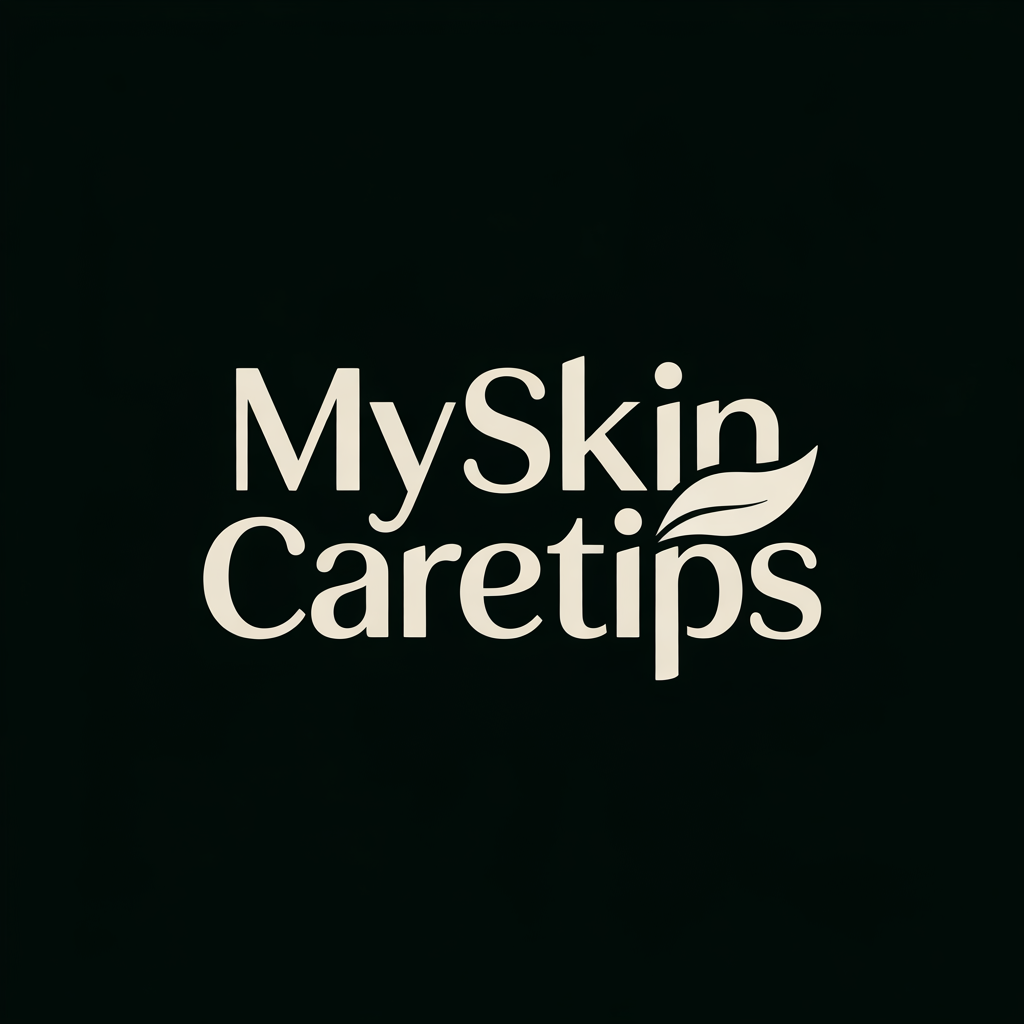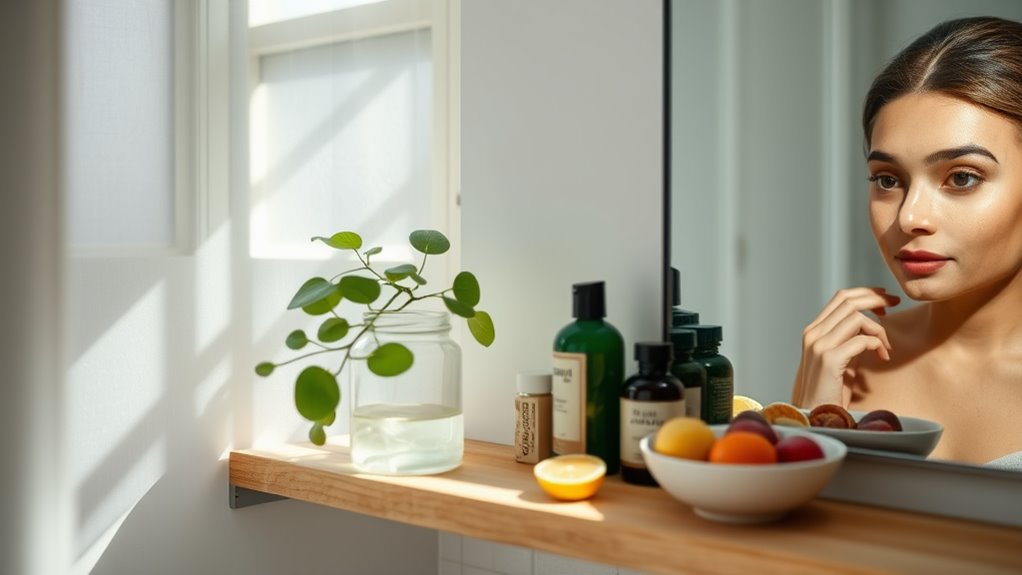How I Cleared My Acne Without Harsh Products
To clear your acne without harsh products, first, identify your skin type to choose suitable products. Stick to a consistent skincare routine that includes gentle cleansing and moisturizing with non-comedogenic ingredients. Incorporate natural remedies like tea tree oil and aloe vera to reduce inflammation. Make dietary changes, such as eating more omega-3-rich foods and antioxidants, while managing stress through mindfulness techniques. Staying hydrated is also vital for skin health. Discover more strategies to enhance your approach.
Understanding My Skin Type
How well do you understand your skin type?
Knowing whether you have oily, dry, combination, or sensitive skin is essential for effective acne management.
For instance, oily skin produces excess sebum, leading to clogged pores and breakouts, while dry skin can result in irritation and inflammation.
Tailoring your skincare products to your specific skin type is one of the best acne tips.
For oily skin, consider non-comedogenic moisturizers and lightweight serums.
If you have dry skin, look for hydrating ingredients like hyaluronic acid.
Understanding your skin type empowers you to choose the right products, minimizing the risk of exacerbating acne. Additionally, recognizing your skin type can help you develop a personalized skincare routine, which is crucial for achieving clear skin.
The Importance of a Consistent Skincare Routine
A consistent skincare routine is essential for effectively managing acne and promoting overall skin health.
Regularly cleansing, moisturizing, and applying treatment products helps maintain skin barrier function and prevents excessive oil production.
Studies show that consistency in using non-comedogenic products can reduce the frequency and severity of breakouts.
Additionally, sticking to a routine allows you to monitor your skin’s response, making it easier to identify what works best for you.
Skipping steps or frequently changing products can lead to irritation and compromised skin health.
Prioritizing a routine equips your skin with the stability it needs to heal and thrive. Incorporating an effective breakout routine can further enhance your skin’s clarity and resilience.
Natural Ingredients That Made a Difference
Natural ingredients have gained popularity in skincare due to their effectiveness and gentleness on the skin, making them a valuable addition to acne treatment.
Ingredients like tea tree oil possess antimicrobial properties, helping to reduce inflammation and bacteria on the skin.
Aloe vera soothes irritation and promotes healing, while honey’s antibacterial qualities enhance moisture without clogging pores.
Additionally, witch hazel acts as a natural astringent, minimizing excess oil production.
Incorporating these natural elements into your routine can greatly improve skin health and reduce acne breakouts. DIY acne treatments often leverage these ingredients for their beneficial effects.
Always patch test new ingredients to guarantee compatibility with your skin type.
Dietary Changes for Better Skin
To improve your skin health, focusing on dietary changes can be essential.
Incorporating foods rich in antioxidants, omega-3 fatty acids, and vitamins can support clearer skin, while avoiding processed sugars and dairy may help reduce inflammation and breakouts. Research indicates that foods high in sugar can trigger acne flare-ups, making it crucial to identify and eliminate these triggers from your diet.
Making these adjustments in your diet can lead to significant improvements in your acne condition.
Foods to Incorporate
Incorporating certain foods into your diet can greatly enhance your skin’s health and help combat acne.
Focus on foods rich in omega-3 fatty acids, like salmon and walnuts, which reduce inflammation.
Antioxidant-rich fruits and vegetables, such as berries and spinach, protect skin cells from oxidative stress.
Probiotics found in yogurt and fermented foods improve gut health, potentially reducing acne flare-ups.
Zinc-rich foods, like pumpkin seeds and chickpeas, support skin healing and regulation of oil production.
Finally, hydration is essential; drinking adequate water helps maintain skin elasticity and flush out toxins.
These dietary changes can greatly improve your skin’s condition.
Foods to Avoid
While adding beneficial foods can improve skin health, avoiding certain items is equally important for managing acne.
Research indicates that specific dietary choices can exacerbate skin issues.
Here are five foods to steer clear of:
- Dairy products: Linked to increased hormone levels that may trigger breakouts.
- Sugary foods: High glycemic index foods can cause insulin spikes, worsening acne.
- Processed snacks: Often contain unhealthy fats and preservatives that can inflame the skin.
- Fried foods: These can increase oil production, leading to clogged pores.
- Refined grains: Such as white bread, which can elevate blood sugar and promote acne.
Make mindful choices for clearer skin.
Stress Management Techniques
Stress plays a major role in exacerbating acne, making effective stress management techniques essential for clearer skin.
Incorporating mindfulness practices, such as meditation and deep breathing exercises, can greatly reduce stress levels. Research shows that these techniques lower cortisol, a hormone linked to acne flare-ups. Regular physical activity, like walking or yoga, also helps by releasing endorphins and improving mood. Additionally, maintaining a structured sleep schedule promotes hormonal balance, which can further benefit skin health. Furthermore, managing stress through these techniques can lead to healthier skin and improved overall well-being.
The Role of Hydration in Skin Health
Proper hydration is essential for maintaining healthy skin, as it directly impacts its elasticity, appearance, and overall function.
When you’re well-hydrated, your skin can better regulate oil production and combat acne.
Here are key benefits of hydration for your skin:
- Enhances skin elasticity, reducing the appearance of fine lines.
- Helps flush out toxins, minimizing breakouts.
- Supports the skin barrier, preventing moisture loss.
- Promotes a radiant complexion by improving blood circulation.
- Aids in nutrient absorption, nourishing skin cells.
Drinking adequate water and using hydrating products can greatly contribute to clearer, healthier skin. Additionally, increased water consumption can unlock radiant skin through its transformative effects.
Prioritize hydration for ideal skin health.

